- Home
- Iain Pears
The Last Judgement Page 10
The Last Judgement Read online
Page 10
Jeanne Armand, however, was one of those who makes even the well-balanced and mature type act a bit oddly. Women often make very sneering comments about male responses in this area, but it is most unfair. Many men are, for the most part, quite good at keeping control and conducting themselves with decorum in strained circumstances. But sometimes, in very exceptional cases, there is nothing to be done; it is as simple as that. A sort of hormonal autopilot takes over which causes hot flushes, trembling hands and a tendency to stare with all the intelligence and sophistication of a rabbit hypnotized by car headlights.
This woman, or more particularly her Raphael face, her beautiful brown hair, delicate hands, perfect figure, soft smile, green eyes, exquisitely chosen clothes – and so on, and so on – was one of those people who triggers such a reaction that the continuance of even moderately civilized behaviour is an almost superhuman triumph of the will, for which those who manage it should be complimented for their strength rather than criticized for their weakness. Somehow or other she managed to combine a gentle tranquillity with just a hint of wildness. Madonna and Magdalen all in one, gift-wrapped in Yves Saint-Laurent. Potent stuff.
The element that pushed him over the edge was that the woman spoke to him in English, having discerned instantly that his French, while serviceable, was hardly up to the Racine level of eloquence. It was the accent; the woman even sounded beautiful.
‘What?’ he said hazily after a while.
‘Would you like a drink?’
‘Oh. Yes. Gosh. Super.’
‘What would you like?’ she continued patiently. It may well be that she was used to this sort of thing.
By the time that Argyll’s pastis had been ordered, he had totally lost control of the proceedings. While he had complacently anticipated an evening of gentle probing, careful pumping and subtle interrogation on his part, instead he was the one who was probed, pumped and interrogated. And loved every minute of it.
Unusually for someone who much preferred to listen to others, he told her about life in Rome, and the difficulties of selling pictures, and his recent tangle with this painting.
‘Let me see the picture,’ she said. ‘Where is it?’
‘Ah. Didn’t have time to go and get it,’ he said. ‘Sorry.’
She looked displeased with that, and being who she was, Argyll would have crawled on his hands and knees all the way to the hotel and back if it would have made her forgive him. A small, very small part of him was still conscious enough to be profoundly grateful that Flavia was several hundred miles away. He could almost visualize the look of lofty disdain on her face.
‘Could you describe it, then?’
He obliged.
‘That’s the one. It disappeared about three weeks ago.’
‘Why didn’t Monsieur Rouxel report it to the police?’
‘He did, initially. But then decided not to pursue the matter. It wasn’t insured, there was no hope of getting it back and there seemed little point in wasting everybody’s time. He decided to treat it as the cost of not locking his house up properly and forgot about it.’
‘Still –’
‘And now you’ve not only recovered it, you’ve found out whose it is and you’ve brought it back. Monsieur Rouxel will be so grateful …’
She smiled at him in the sort of fashion that melts pig-iron. He looked down his nose modestly, and felt a bit like St George after he has successfully sliced up a dragon or two.
‘That is, if you’re willing to let him have it back.’
‘Of course. Why not?’
‘You might insist on some form of remuneration for your time and effort.’
Well, he might. But in the interests of chivalry he was prepared to waive the matter.
‘So,’ she went on as he adopted the pose of someone with so much money that any reward would be a trivial matter, ‘tell me how you got hold of this painting.’
In great detail, he did. About Besson and Delorme and men with scars and train stations and Muller and Ellman and the police and libraries and museum curators. Nothing left out. She was fascinated, staring at him with wide-eyed attention all through the discourse.
‘So. Who did it? Who was responsible?’ she asked when he finished. ‘Who is on top of the police list at the moment?’
‘I haven’t a clue,’ he answered. ‘I’m hardly privy to their innermost thoughts. But from what I can gather no one is, really. There’s this man with the scar, of course. But as no one has a clue who he is, it seems unlikely they will catch him. Unless they’ve made progress in my absence, they don’t even know why Muller wanted the picture so badly. I mean, it belonged to his father, but so did many other things. And that’s no reason to steal it anyway. Do you have any idea?’
‘None,’ she said, shaking her head to give the word extra emphasis. ‘I mean, I remember the picture quite well now. It’s not exactly world-class, is it?’
‘No. But how long has Monsieur Rouxel had it?’
‘He got it when he was young. He said so, once. But where it came from I don’t know.’
They refilled their drinks and dropped the subject; there seemed little else to say on the matter really. Instead she turned her attention to Argyll. He retold all his little stories about the art business, his complete run of whimsy, jokes and scandal, and she looked properly shocked, impressed and amused in all the right places. Such eyes she had. Occasionally she would laugh outright, resting her hand on his arm in appreciation at well-delivered anecdotes. He told her about life in Rome, about clients, about selling pictures and buying them, about fakes and forgeries and smuggling.
The only thing about his life he didn’t mention all evening was Flavia.
‘And what about you?’ he said, returning to the really important question. ‘How long have you worked for Monsieur Rouxel?’
‘Several years. He’s my grandfather, you know.’
‘Oh, I see,’ he said.
‘I organize his life for him, and help with the running of some of the small companies he still owns.’
‘I thought he was a big-business type. Or a lawyer. Or a politician. Or something.’
‘All of the above. So he was. But since he retired he took on a couple of smaller operations. Stock-broking, mainly. More to keep himself active than anything else. That was going to be my speciality as well.’
‘Was?’
‘I began. Then Grandfather asked me to help him sort out his papers. You can imagine how many someone like him has accumulated over the years. Judicial papers, and business papers and political ones. And he didn’t want a stranger going through them. It was just meant to be for a short while, when he was ill and overburdened, but I’m still there. I finished organizing his archives years ago but he can’t do without me. I used to suggest he got someone more permanent, but he says always that nobody could ever be as efficient as me. Or as used to his ways.’
‘Do you like that?’
‘Oh, yes,’ she said quickly. ‘Of course. He’s such a wonderful man. And he needs me. I’m his only family. His wife died young. Such a tragedy; it had been a brilliant match, and he’d loved her for years before they married. And my own mother died having me. So there’s no one else. And someone has to stop him over-extending himself. He can never say no. They keep on asking him to serve on committees and he always says yes. Except when I can intercept the mail and say no first.’
‘You do that?’
‘Privileges of a secretary,’ she said with a faint smile. ‘Yes. I open all his mail, after all. But sometimes they get through. There’s this international financial committee he’s on at the moment. Constant journeys and meetings. It exhausts him, and serves no purpose. But will he give it up and stop wasting his time? Oh no. He’s so kind and so helpful he’d never have a minute to himself if I didn’t stop people wasting his time.’
For the first time that evening, Argyll had a rival. It wasn’t just that Jeanne liked or respected her grandfather, she seemed to come close to her
o-worship. Perhaps Rouxel deserved it. For her he was not only a perfect employer, he was also one of the greatest men alive. Overdoing it a bit, though, wasn’t she? Trying so hard to convince him. And what did she get in return? he wondered.
‘He was given the Croix de Guerre,’ Argyll said.
She smiled and shot him a little glance. ‘You’ve been doing your homework, I see. Yes. He was. For his work in the Resistance. He never talks about it, but I gather he was very nearly killed several times, and he dealt with all the internal squabbling. Somehow or other he emerged with his general faith in human nature intact. I don’t know how he did it really.’
‘You have a great admiration for him,’ he commented. ‘What happened to his political career?’
‘Some people’s failures are greater than their achievements. He was honest. Too honest. He wanted to clear out some of the time-servers and incompetents in the ministry. Not surprisingly, they fought back. He played clean, they played dirty, he lost. Simple as that. He learnt his lesson.’
‘Do you like him as well as admire him?’
‘Oh, yes. He is kind, generous and courageous, and has been very good to me. The sort of man who inspires affection and trust. How could I not like him? Everybody else does.’
‘Somebody must dislike him,’ Argyll commented.
‘What do you mean by that?’
‘Well,’ he said, a bit surprised by the sharp tone that crept into her voice. ‘He’s powerful and successful. Reading between the lines he’s still very influential. And that creates jealousy. No one like that is universally loved.’
‘I see. Perhaps you’re right. Certainly he’s always fought for things he thought were right. But I can honestly say I have never come across anyone who had a personal dislike of him. Universally loved, no. Universally respected, yes. I think you could claim that. That’s why he’ll be up there receiving the Europa prize in a couple of weeks.’
‘The what?’
‘Have you not heard of it?’
Argyll shook his head.
‘It’s a bit difficult to describe. It’s a sort of European Community Nobel prize for politics. Each government nominates one of its citizens and one person is chosen from the short list. It’s for a lifetime’s achievement. It’s only been awarded a few times; it really is an extraordinary honour.’
‘So what does it involve? I mean, is it just a question of turning up and collecting the cheque?’
She looked disapproving, as though he weren’t taking the honour seriously. ‘There’s a ceremony at the next meeting of the Council of Ministers. Monsieur Rouxel will be given the award, and then address every head of government in the community, and the Parliament. He’s been working on his speech for months. It’ll be a summary of his vision for the future and, believe me, it’s very good indeed. A sort of statement of his life’s principles. A summing-up of everything he believes in.’
‘Splendid. I shall look forward to reading it,’ he said politely but not entirely truthfully. There was a pause as each looked at the other wondering what to do next. Argyll resolved the situation by calling for the bill and paying it. Then he helped her on with her coat and they walked out into the night air.
‘It was very kind of you to see me …’ he began.
She moved closer and rested her hand on his arm, looking steadily into his eyes.
‘Why don’t we go to my apartment for a drink? It’s just down there,’ she said softly, pointing down a street to his left. That slightly wild look was back again.
One of the most popular types of picture of the late seventeenth century was the classical allegory, in which mythological subjects were used to illustrate moral issues. An enormously popular topic was entitled the Judgement of Hercules. It was painted dozens of times in the baroque era.
The subject is very simple: Hercules, the strong man of antiquity, dressed in a scanty lion-skin so that the viewer can both identify him and admire the painter’s skill at depicting the male torso, stands in the middle, listening to two women. Both are beautiful, but one is dressed in often quite severe clothes which cover most of her body, and frequently carries a sword. She may be shown with the finger of one hand raised as though making a not very appealing point. She is Virtue, sometimes personified as Athene, daughter of Zeus and defender of just causes.
On the other side, often lying languidly on the ground, and always semi-naked, is another figure. She may not be doing much of the talking, but she lies there tempting Hercules by her very presence. She is the easy life, sometimes Vice, occasionally Temptation, personified as Aphrodite, goddess of love. To the left, on the side where Athene stands, is a road, quite rocky and hilly, which leads to fame and fulfilment; on the side where Aphrodite lies is a gentle path, leading past all sorts of pleasure and going nowhere.
Hercules is listening to the women’s arguments, trying to make up his mind which one to choose. Generally his face would be that of the patron who paid for the picture, and he would be depicted at the very moment he plumps for the life of virtue. A handsome and decorous bit of flattery.
And to Argyll’s left, as this piece of art-historical trivia passed through his mind, lay the street which led back to his hotel, and to his right lay the road to Jeanne’s apartment.
Hercules at least had time to think about it, to weigh up the pros and cons, to ask supplementary questions and find out what he was letting himself in for. Argyll had to weigh Jeanne’s invitation, his attraction to her, his love of Flavia, all at the same time.
‘Well?’
‘I’m sorry. I was thinking.’
‘Does it need to be thought about?’
He sighed and touched her on the shoulder. ‘No, not really.’
And, like Hercules, he reluctantly trod the path of virtue.
10
Flavia’s train arrived in Paris at 7:15 the next morning, and she was ejected unceremoniously by the station porters into the cold, windy hall of the Gare de l’Est while still half asleep. It had been a rotten ride: non-stop interruptions from screaming babies, ticket-inspectors, new arrivals in the compartment and sudden, jerking stops waking her up, it seemed, every five minutes. She felt dirty, unkempt and ragged. God, just look at me, she thought as she looked at herself in a mirror. What a mess. At least Jonathan never notices. She was looking forward to seeing him; he was a reassuring person to be around and, even though he was frequently mightily irritating, she found herself pleasurably anticipating a long chat. There hadn’t been much to be cheerful about recently, after all.
She was half inclined to stop and have a coffee and a proper breakfast before heading off to his hotel. What she thought was his hotel, anyway. It had never occurred to her that he might be staying in a different one. Now that it did, she realized she had a potential problem on her hands. How would she ever find him? Equally alarming, what if he’d gone back to Rome?
Worry about that later, she told herself. The more immediate problem was that no bars were yet open, she had no French money, and consequently couldn’t take a taxi.
She walked down the stairway into the Métro, worked out where she was meant to be heading, then stood and watched the passers-by. About one in ten came up to the turnstiles, looked around carefully and vaulted over. Although there were official-looking types around, they paid no attention. When in Paris, do as the Parisians, she thought. Clutching her bag, she hopped over the barrier, then scampered off down to the platform, feeling atrociously guilty.
She had once stayed with Argyll in his usual hotel, and remembered it was somewhere near the Panthéon. Exactly where was more difficult: it is an area with a lot of hotels, and all Flavia could remember was that it had a very ornate door. On the fourth go she didn’t find it, but at least got directions from an early-morning porter to the right place. She finally arrived at 8:15.
Did they have a Jonathan Argyll staying here?
A flipping of pages, then the man at the desk admitted that they did.
Where was he?
No, it was all right. She’d just go up.
And so she did, walking up the stairs, finding the right door and knocking on it vigorously.
‘Jonathan?’ she called. ‘Open up. It’s me.’
There was a long silence. There was no one in. Unlike him, she thought. Not one of the world’s early risers.
She stood outside the door for a few moments, wondering what to do next. Of all the possibilities she’d considered, the idea that he might be out had never crossed her mind.
Fortunately, she did not have to resolve the problem of what to do next on her own. A clumping of feet up the stairs – Argyll was no ballet-dancer – indicated that the decision was made for her.
‘Flavia!’ Argyll said as he appeared, in much the same tone as you’d expect from a stranded mountaineer greeting his favourite St Bernard as it turns up with a keg of brandy.
‘There you are. Where have you been at this ungodly hour?’
‘Me? Oh, nowhere, really. Just to get some cigarettes. That’s all.’
‘Just after eight on a Sunday morning?’
‘Is it? Oh. I couldn’t sleep. I’m so pleased to see you. Here.’
And he wrapped his arms around her and hugged her with a vehemence she had not noticed in him before.
‘You look really beautiful,’ he said, standing back and looking at her admiringly. ‘Quite wonderful.’
‘Is anything the matter?’ she asked.
‘No. Why do you ask? But I had an awful night. Tossing and turning.’
‘Why was that?’
‘Oh, nothing. I was thinking.’
‘About your picture, I suppose?’
‘Eh? No, not about that. I was thinking about life. Us. That sort of thing.’
‘What?’
‘It’s a long story. But I was wondering what it would be like if we split up.’
‘Oh, yes?’ she said, a little perturbed. ‘What makes you think of that?’
‘It would be awful. I couldn’t face it.’
‘Ah. Why is this in your mind at the moment?’

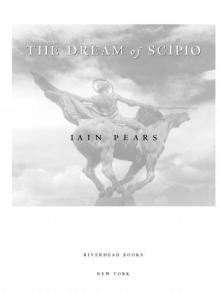 The Dream of Scipio
The Dream of Scipio Stone's Fall
Stone's Fall The Last Judgement
The Last Judgement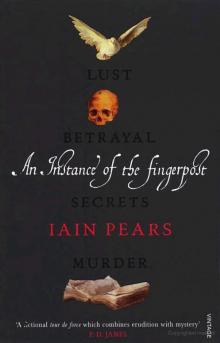 An Instance of the Fingerpost
An Instance of the Fingerpost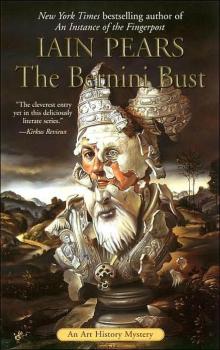 The Bernini Bust
The Bernini Bust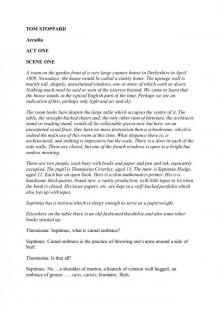 Arcadia
Arcadia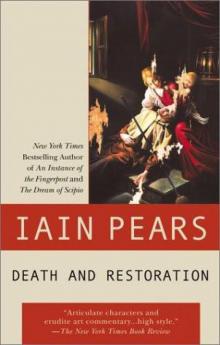 Death and Restoration
Death and Restoration The Raphael Affair
The Raphael Affair The Titian Committee
The Titian Committee The Immaculate Deception
The Immaculate Deception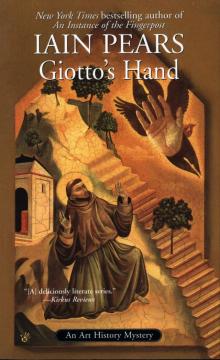 Giotto's hand
Giotto's hand The Portrait
The Portrait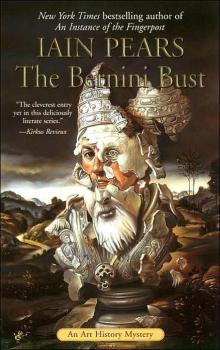 The Bernini Bust ja-3
The Bernini Bust ja-3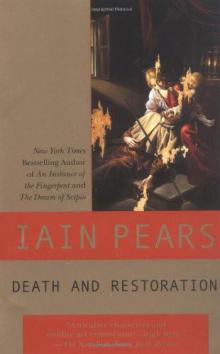 Death & Restoration ja-6
Death & Restoration ja-6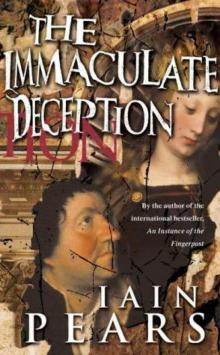 The Immaculate Deception ja-7
The Immaculate Deception ja-7